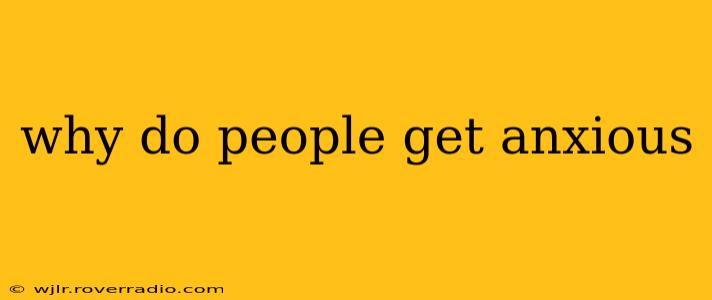Anxiety is a pervasive human experience, affecting millions worldwide. While feeling anxious occasionally is normal, persistent or overwhelming anxiety can significantly impact daily life. Understanding the underlying reasons for anxiety is crucial for developing effective coping mechanisms and seeking appropriate support. This exploration delves into the multifaceted nature of anxiety, examining biological, psychological, and environmental factors.
What Causes Anxiety? A Multifaceted Perspective
The simple answer to "Why do people get anxious?" is complex. It's not a single cause but rather a confluence of factors interacting to create an anxious response. Let's break it down:
Biological Factors:
- Genetics: Family history of anxiety disorders significantly increases an individual's risk. Genetic predispositions can influence neurotransmitter imbalances and brain structures linked to anxiety regulation.
- Brain Chemistry: Imbalances in neurotransmitters like serotonin, GABA, and norepinephrine are often associated with anxiety disorders. These chemicals play vital roles in mood regulation, and their disruption can lead to heightened anxiety levels.
- Physical Health: Certain medical conditions, such as hyperthyroidism, heart conditions, and respiratory problems, can trigger anxiety symptoms. It's essential to rule out physical causes before focusing solely on psychological factors.
Psychological Factors:
- Personality Traits: Individuals with certain personality traits, like neuroticism (a tendency towards negative emotions) or perfectionism, might be more prone to anxiety. These traits can amplify stress responses and make it harder to manage challenging situations.
- Negative Thinking Patterns: Catastrophizing (expecting the worst), overgeneralization (drawing broad conclusions from single events), and all-or-nothing thinking can fuel anxiety. These cognitive distortions distort reality and create unnecessary worry.
- Learned Behaviors: Anxiety can be learned through conditioning. For example, a negative experience in a specific situation might trigger anxiety in similar future scenarios. This learned association can perpetuate anxiety cycles.
- Trauma: Past trauma, including physical or emotional abuse, neglect, or significant loss, can significantly increase the risk of developing anxiety disorders. Trauma can alter brain function and emotional processing, leading to heightened anxiety.
Environmental Factors:
- Stressful Life Events: Major life changes, such as job loss, relationship problems, financial difficulties, or bereavement, can overwhelm coping mechanisms and trigger anxiety. The accumulation of smaller stressors can also contribute.
- Social and Cultural Factors: Societal pressures, expectations, and cultural norms can create anxiety-provoking environments. For example, competition, social media comparisons, and fear of judgment can significantly impact mental well-being.
What are the Symptoms of Anxiety?
Recognizing the symptoms of anxiety is crucial for early intervention. These can vary widely but often include:
- Physical Symptoms: Rapid heartbeat, shortness of breath, sweating, trembling, muscle tension, dizziness, nausea, and sleep disturbances.
- Emotional Symptoms: Excessive worry, fear, irritability, restlessness, feeling overwhelmed, and difficulty concentrating.
- Behavioral Symptoms: Avoidance of anxiety-provoking situations, restlessness, and changes in sleep patterns.
How Can I Manage My Anxiety?
Managing anxiety often requires a multi-pronged approach:
- Therapy: Cognitive Behavioral Therapy (CBT) and other evidence-based therapies are highly effective in treating anxiety disorders. These therapies teach coping mechanisms and help individuals challenge negative thoughts and behaviors.
- Medication: In some cases, medication can be helpful in managing anxiety symptoms, particularly when severe. Anti-anxiety medications and antidepressants can regulate neurotransmitter imbalances.
- Lifestyle Changes: Regular exercise, a balanced diet, sufficient sleep, mindfulness practices, and stress-reduction techniques (such as yoga or meditation) can significantly impact anxiety levels.
Is Anxiety a Mental Illness?
While everyone experiences anxiety from time to time, when anxiety becomes persistent, overwhelming, and interferes with daily life, it may indicate an anxiety disorder. These disorders are diagnosable mental illnesses requiring professional help.
When Should I Seek Professional Help?
If you're experiencing persistent anxiety that significantly impacts your daily functioning, it's crucial to seek help from a mental health professional. They can provide a proper diagnosis and develop a personalized treatment plan.
This information is for educational purposes only and does not constitute medical advice. If you have concerns about your mental health, please consult a qualified healthcare professional.
